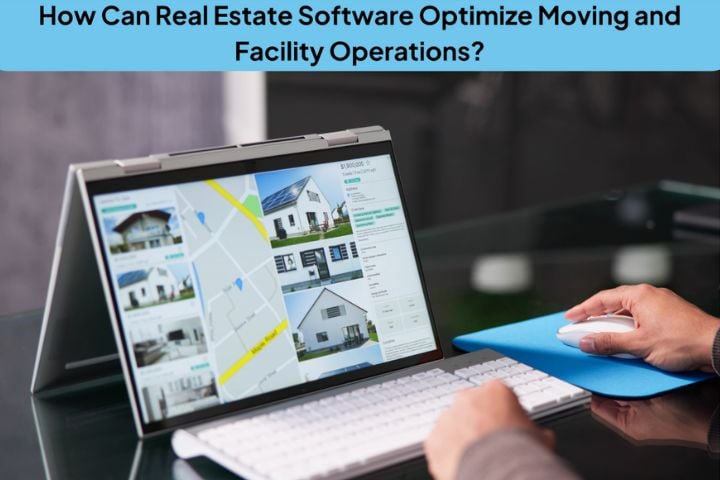Imagine juggling multiple properties, each with its unique set of challenges, all while striving to deliver exceptional tenant experiences and drive business growth. In the high-stakes world of real estate, inefficiencies can lead to costly delays, dissatisfied tenants, and missed opportunities.
Real estate software steps in as a transformative force, revolutionizing how moving and facility operations are handled. These advanced tools streamline complex processes, enhance communication, and provide actionable insights, enabling property managers to operate with precision and agility.
In this blog, we explore the pivotal ways real estate software can elevate your operations, ensuring smooth transitions, boosting tenant satisfaction, and strategic expansion in an ever-evolving market.

Streamlining Property Management Processes
Efficient property management is the backbone of successful real estate operations. By using commercial real estate management software, property managers can revolutionize operations by automating routine tasks and centralizing data, allowing them to focus on strategic initiatives rather than getting bogged down by administrative duties.
Automating Routine Tasks
Automation simplifies complex processes, making property management more efficient and less error-prone.
- Tenant Onboarding and Lease Management: Automate the entire tenant onboarding process, from application to lease signing. Digital lease management ensures all documents are stored securely and accessible when needed.
- Maintenance Request Tracking and Resolution: Streamline maintenance operations by automating request submissions, assignments, and tracking. This ensures timely resolutions and improves tenant satisfaction.
Centralizing Data for Enhanced Decision-Making
Centralized data provides a holistic view of property performance, facilitating informed decision-making. Monitor key performance indicators in real-time, enabling proactive management and swift responses to any issues. Seamlessly integrate with accounting, CRM, and other essential systems to gain comprehensive insights into all aspects of property management.
Addressing Common Real Estate Challenges with Software
Real estate operations come with their unique set of challenges. Below is a table that maps common challenges to the software features that address them, providing clear solutions to optimize your operations.
| Challenges | Real Estate Software Feature | Solution Provided |
| Time-consuming lease management | Automated Lease Management | Streamlines lease creation, tracking, and renewals |
| Inefficient maintenance request handling | Maintenance Request Tracking and Resolution | Automates submission, assignment, and tracking |
| Data silos and fragmented information | Centralized Data and Integration | Unifies data across systems for better insights |
| High operational costs | Cost-Saving Analytics | Identifies inefficiencies and reduces expenses |
| Poor tenant communication and engagement | Tenant Communication Portal | Provides centralized support and information access |
| Compliance with multiple regulations | Compliance Automation | Keeps up-to-date with regulations and simplifies reporting |
| Difficulty in strategic decision-making | Real-Time Data Analytics and Reporting | Provides actionable insights for informed decisions |
| Scaling operations across multiple properties | Scalable Software Solutions | Ensures consistent standards and processes |
This table directly links operational challenges with software features and the solutions provided, helping you understand how real estate software can address specific issues.
Enhancing Operational Efficiency
Operational efficiency is pivotal in reducing costs and maximizing resource utilization. Real estate software plays a significant role in optimizing resource allocation and reducing operational costs.
Optimizing Resource Allocation
Effective resource allocation ensures that maintenance, repairs, and staffing are handled efficiently.
Automate scheduling to ensure maintenance tasks are performed promptly without overburdening staff.
Balance workloads by assigning tasks based on real-time data and staff availability, enhancing productivity and job satisfaction.
Reducing Operational Costs
Cost reduction is achieved through automation and data-driven insights. Automation reduces the likelihood of human error, ensuring accuracy in financial transactions and reporting. Utilize data analytics to uncover inefficiencies and implement strategies that reduce expenses without compromising quality.
Improving Tenant Experience and Retention
A satisfied tenant is more likely to renew leases, making tenant experience and retention critical for sustained success. Real estate software enhances tenant interactions through seamless communication and personalized services.
Facilitating Seamless Communication
Effective communication fosters a positive tenant-landlord relationship. Offer tenants a centralized platform to access support, submit requests, and find information about their property. Collect and analyze tenant feedback to identify areas for improvement and address concerns promptly.
Personalizing Tenant Services
Personalization enhances the overall living or working environment, making tenants feel valued.
- Utilizing Data to Tailor Services to Tenant Needs: Analyze tenant data to offer customized services, such as targeted maintenance or amenity upgrades.
- Enhancing the Overall Living or Working Environment Through Smart Technologies: Integrate smart technologies to improve comfort, security, and convenience for tenants.
Ensuring Compliance and Risk Management
Regulatory compliance and active risk management are vital in safeguarding your business and ensuring tenant trust. Real estate software helps drive automation of compliance tracking and risk mitigation through predictive analytics.
Compliance Tracking Automation
Maintaining compliance with local, state, and federal regulations can be a very tiring process. Automation makes things much easier. If you start tracking automatically, you will remain aware of all the latest relevant regulations, minimizing the chance of being considered non-compliant. Smoothen the processes of documentation and reporting to ease the burden of meeting regulatory requirements.
Risk Mitigation through Predictive Analytics
Predictive analytics produces data through which one can identify and address issues before they become major ones. Analyze the trends in data output for foreseeing problems and averting breakdowns to ensure seamless operations and plan maintenance in advance to avoid expensive repairs and disruption to tenants.
Facilitating Strategic Planning and Growth
Strategic growth is a major determinant of long-term success. Real estate software supports data leveraging for market analysis and seamless scaling of operations.
Leveraging Data for Market Analysis
Data-driven market analysis fosters the identification of trends and opportunities, thus informing strategic decisions.
Identify Trends and Opportunities: Analyze market data to keep yourself ahead of emerging trends and opportunities.
Data-Driven Insights into Property Acquisitions and Dispositions: Leverage comprehensive data to make strategic decisions regarding property acquisitions and dispositions.
Scalability of Operations
Your business is growing, and scaling operations without compromising quality is a key concern.
- Software Solutions that Scale with Business Growth: Select scalable software solutions that grow with your business to maintain performance.
- Consistency in Operational Standards: Maintain consistent standards and operating procedures throughout all properties for enhanced efficiencies and tenant satisfaction.
FAQs
How does real estate software integrate with existing systems in moving and facility operations?
Real estate software connects via APIs and data sync tools for seamless information flow between platforms.
Can real estate software help in reducing downtime during property transitions?
Yes, it optimizes scheduling and communication to minimize delays during property moves.
What are the security measures in place to protect sensitive data within real estate software?
It employs encryption, multi-factor authentication, and regular security checks to protect data.
Conclusion
Real estate software offers a solution to streamline property management, enhance operational efficiency, improve tenant experiences, ensure compliance, and facilitate strategic growth. By automating routine tasks, centralizing data, and leveraging advanced analytics, these tools empower property managers to make informed decisions, reduce costs, and foster stronger tenant relationships.
Embracing real estate software is a strategic investment that drives operational excellence and positions your business for sustained success in an ever-evolving market. Equip your operations with these advanced tools to navigate challenges, seize opportunities, and achieve your business objectives with confidence.
We hope you found this blog post How Can Real Estate Software Optimize Moving and Facility Operations? useful. Be sure to check out our post Software With Best Real Estate Video Templates, for more great tips!
Have Experience in the Moving Industry? Want an Additional Income Stream? Work With All Around Moving!
Partner with us, relocation moving consultant and we’ll help you profit. Click here to learn more.





